This post contains 20 different dip variations, including 4 assisted dip exercises for beginners and weaklings, plus 16 advanced dip exercises for seasoned lifters and calisthenics enthusiasts.
4 Assisted Dip Variations
Are you too weak for bodyweight dips? No biggie. This is a common problem that trainees face when new to the dips exercise. Assisted dips/modified dip variations are the answer.
Tip: Choose one of the dip variations below and work on it until you’re strong enough do a couple reps of unassisted bodyweight dips. If at all possible, do band-assisted dips (#1) – they’ll provide the most rapid strength gains.
- Band-assisted dips: Loop each end of a resistance band around each dip bar handle. Assume the starting dip position, with arms extended, and put your knees against the band. Lower your body against the resistance band until your elbows are at 90°. Dip up to the starting position until your elbows are straight. This dip variation makes the movement easier at the bottom, with minimal assistance at the top. Tip: Use weaker bands as you become stronger to smoothly transition to full body weight dips.
Credit: gshinoskie - Jumping dips with negatives: Grasp the dip bars, with your feet on the floor (or on the dip station platform). Then jump up to give your body just enough momentum so that you can complete the positive rep. Focus on the negative by slowly lowering yourself down.
- Bench dips: Position your body perpendicular to a bench, with your palms on the edge of the bench and elbows extended, supporting your body. Plant your heels on the floor, with your knees slightly bent. Lower your body until your elbows are at 90°. Then dip up by extending your arms until your elbows are straight.
- Assisted dip machine: Set the weight stack to the desired level; the more weight used, the more assistance provided. Grasp the handles, extend your arms and kneel on to the sliding platform. Lower your body by bending your arms until your elbows are at 90° before returning to the starting position.
Source: allaccessfa
16 Advanced Dip Variations
Are regular bodyweight dips too easy for you? No worries, I’ve got you covered with a bunch of dip variations for more experienced lifters. Some of these are better for building raw strength and muscle, while others are better for training “functional” strength.
Tip: Find just one or two variations that work well for you. Personally, I stick mostly to weighted dips (#5), and occasionally I’ll do weighted bench dips (#7), since these are generally best for maximizing muscle gains.
- Weighted dips: Perform the conventional dip technique with weight added to your body. I prefer using a dip belt to add weight. But you can also hold a dumbbell between your ankles, wear a weighted vest, fill a back pack with weights or even wear heavy chains.
- Band-resisted dips: Get two resistance bands. Attach one end of each band to opposite sides of the dip station. Then loop left band over the right side of your neck, and the right band over the left side of your neck. The bands should cross on the front side of your body, as well as on your back. Proceed to execute a set of dips.
Credit: gshinoskie - Weighted bench dips: Get two benches (or a bench + box). Position them parallel and 3-4 feet away from each other. Start out like you’re about to do a bodyweight bench dip but raise your feet onto the second bench (or box). Have a spotter place the desired weight on your lap (use Olympic weight plates). Don’t let your knees lockout, especially with heavy weight. Dip to 90°, push back up and repeat.
- Dip to leg raise: Perform a conventional dip, but bring your legs up at the top of the motion. So, your legs should be parallel to the floor when your elbows are fully extended. Hold this position briefly, lower your legs and then dip down. This makes the upper body muscles work harder, while also adding an intense abs workout into the mix.
- Side-to-side dips: Elevate yourself onto the dip bars, with elbows extended. Dip down and to the left, shifting most of your weight onto your left triceps/shoulder/chest. Then push back up to the starting position, again relying mostly on your left side. Repeat for the right side. You can alternate sides every rep. Or you can do one set all on one side, and the next set all on the other side.
- Ring dips: Get a pair of gymnastic rings
and hang them up on something sturdy (e.g. ceiling beams, a solid power rack). Grasp the handles with an approximately neutral grip (palms toward each other). Hoist yourself off the floor and into the starting position by extending your arms. Dip down by bending your arms until your elbows are at 90°. Press back up to the starting position, and repeat.
Credit: MBodyStrength - Bulgarian dips: Bulgarian dips are a variation of ring dips. The difference is that, on Bulgarian dips, you rotate your wrist as you go back and forth between the top and the bottom of the motion. Specifically, you use an supinated (underhand) grip at the top, and a pronated (overhand) grip at the bottom.
Credit: GymnasticBodies - Korean dips: These are done on a straight bar, or railing of some sort. Start by almost sitting on the edge of the bar, grasping it with a pronated (overhand) grip. Then dip down, back and under the bar in a crescent-like motion, keeping your legs extended. Go until your forearms are just past vertical and your elbows are about 90°. Extend your arms to press back up to the starting position, pushing yourself up through the same crescent-like path, and repeat.
Credit: Ryan Ford - Pronated grip dips: This requires using a straight bar (e.g. one side of a parallel bar set up, a pull up bar that you can get on, or a fixed Olympic barbell). Grasp onto the bar using a pronated (overhand) grip. Extend your arms to hoist your body into the starting position. Dip down, leaning your torso forward to maintain balance, until your elbows are at 90°. Press yourself back to the starting position, then repeat the movement. Note: In the pictures below, I’m using two dip bar handles positioned across the front of the power rack – there is a slight angle, so it’s not exactly a “straight” bar; but it’s close enough, and the angle makes it easier on my wrists.
- Supinated grip dips: This is the exact same as a pronated grip dip (see above), except the grip is reversed: you use a supinated (underhand) grip to hold onto the bar.
- Gironda dips: Grasp the dip bar handles with a wide grip (this is best if done on v-bar dip station). Extend your arms to hoist yourself up into the starting position. Straighten your legs and point them slightly out in front of you. Position your head so that you’re looking down. Maintain this body position throughout the movement. Dip down until your elbows are at 90°. Extend your arms until they’re straight and you’re back in the starting position. Repeat.
- Reverse Grip Gironda dips: This is the same as Gironda dips (see above), with two exceptions: you grasp the bars with your palms facing out and your elbows flare more. This should only be done by people with very flexible shoulders and wrists.
Credit: pbecker62 - Wall dips: Find a half-wall, counter top or other similar surface. Facing the fall, put your palms on the surface, with your fingers pointing forward. Elevate yourself into the starting position by extending your arms until your elbows are straight, leaning your torso significantly forward to stay balanced. Dip down, bending your arms and lowering your torso until your chest touches the top of the wall/surface. Push yourself back up, and repeat.
Credit: Ryan Ford - Elbow dips/Russian dips: You’ll need a parallel bars setup so you have enough room to move your body back and forth. Grasp the bars and extend your arms to get into the starting position. Then push backwards to lower yourself down and back, onto your forearms. Pull yourself forward into the bottom position of a regular dip (forearms vertical, elbows at 90°). Then push yourself up by extending your arms to return to the start. Repeat.
Credit: OfficialBarstarzz - Planche dips: This dip variation is best done on parallel bars, to ensure you have enough room to bring your body to horizontal. Grasp the bars and extend your arms. Keeping your core tight and your legs and back straight, raise your body into the planche position. Dip down until your shoulders are approximately in line with your wrists. Push back up until your elbows are straight. If you can’t achieve the planche position, watch these videos to learn planche progressions.
Credit: OfficialBarstarzz - One arm dips: Get on a pull up bar, and hoist yourself up, such that your torso is above the bar and both arms are extended. Remove one arm from the bar and slowly lower yourself until your upper arm is parallel to the floor. You will have to lean your torso forward and flare your elbow out to the side, in order to balance as you dip down. Once at the bottom, reverse directions, extending your arm until straight. As shown in the image below, you can move your legs and your other arm to help you balance as dip up and down. A good progression for working your way up to the one arm dip is the one arm wall dips, as shown in this video.
Credit: Raffaele Petito



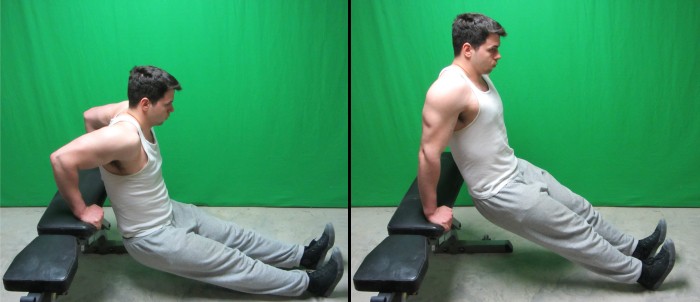
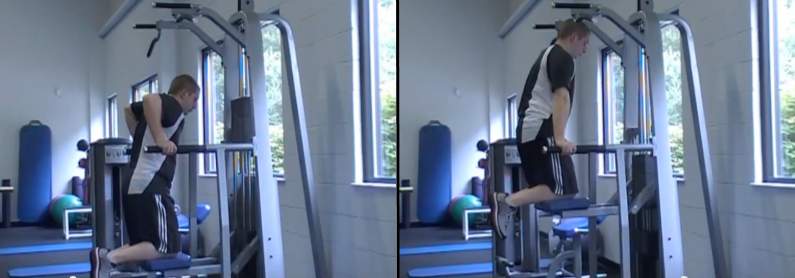
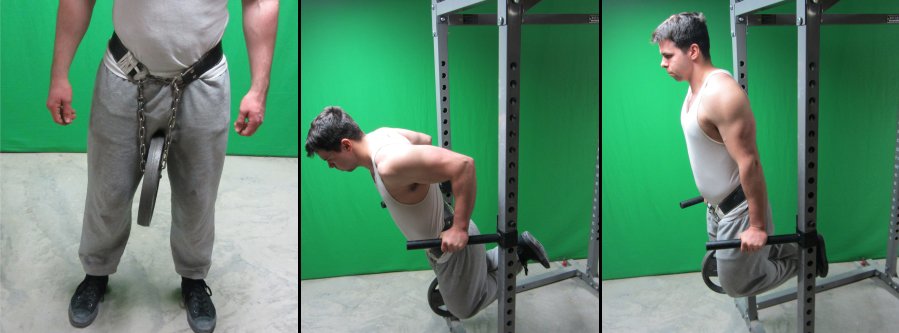

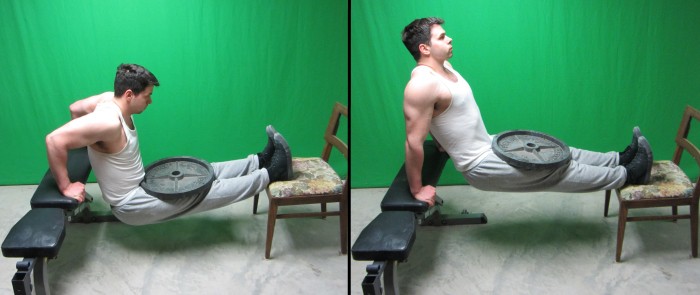
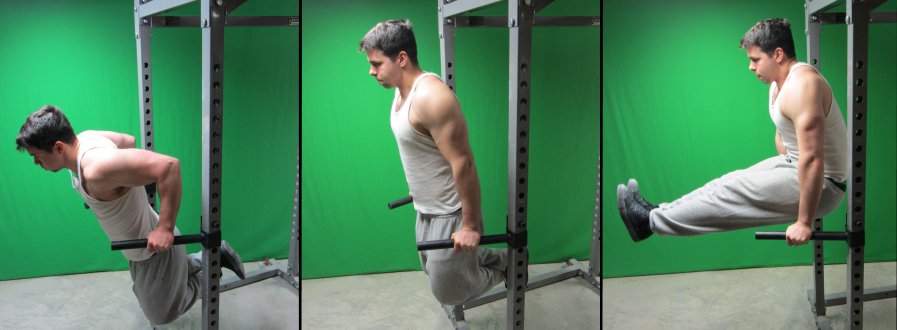

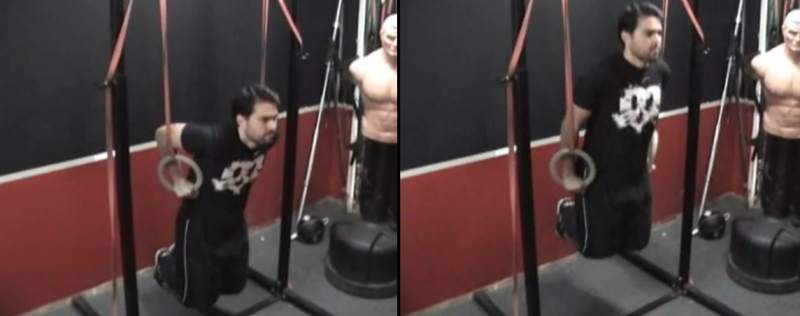
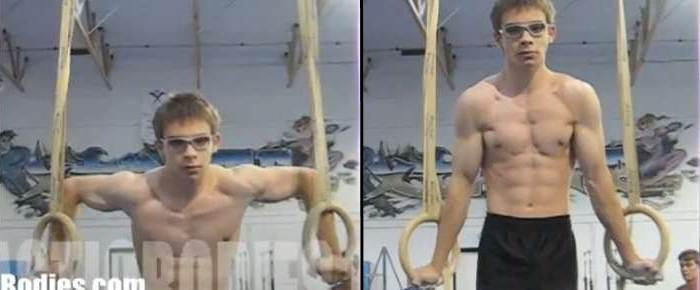
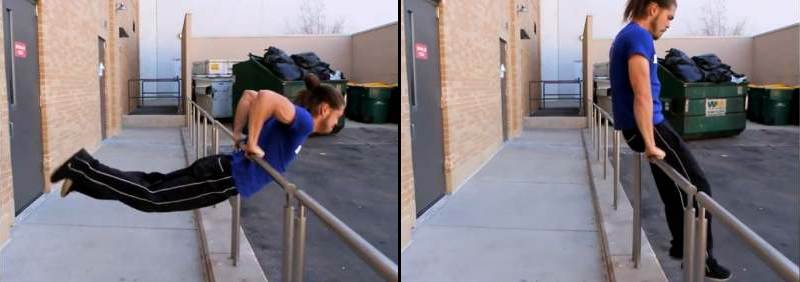
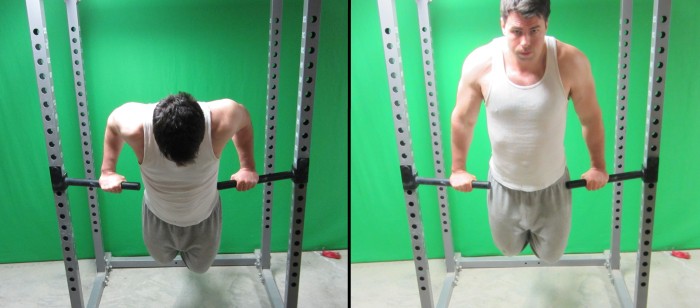
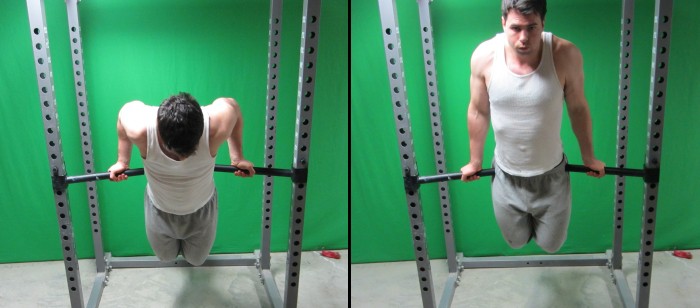
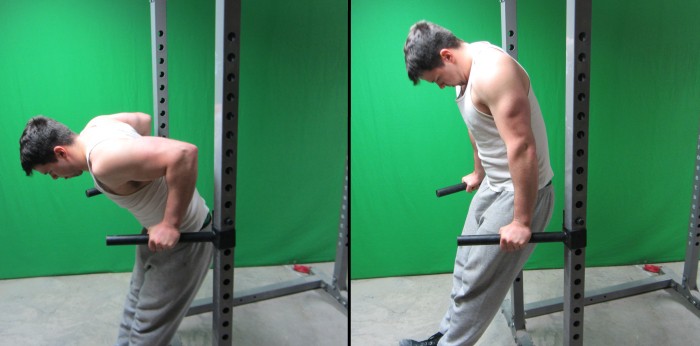
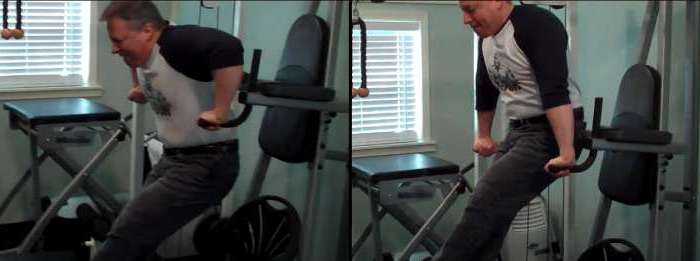
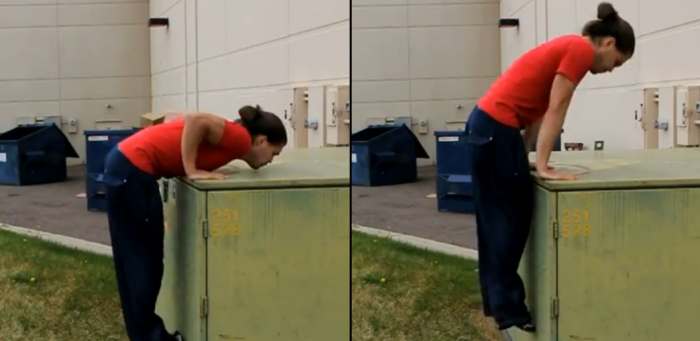

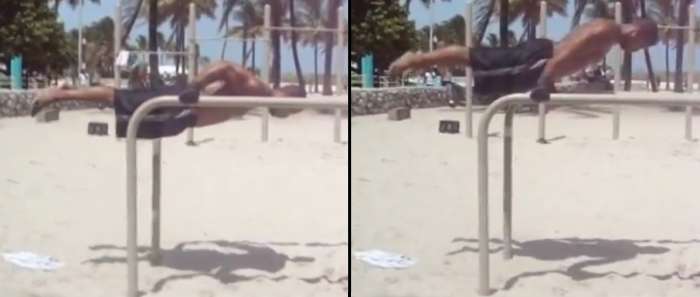
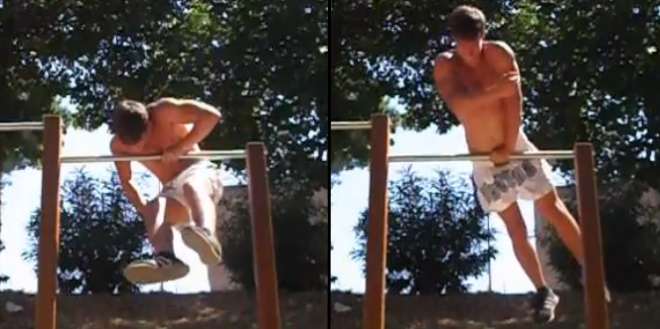

Será que estas variações é para apenas sair da rotina ou muda o treinamento de muscularura ?
Some train the muscles at slightly different angles (e.g. more emphasis on tris/shoulders or more on the chest). Some also make the exercise more difficult (e.g. weight) or less difficult (e.g. assisted).